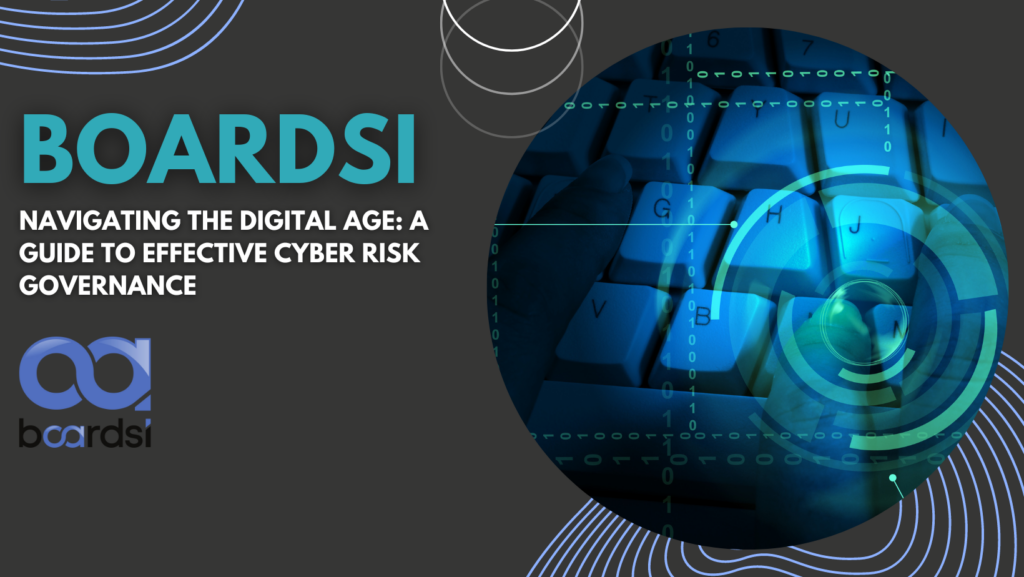The digital age presents a wealth of opportunities for organizations, but it also introduces significant cybersecurity challenges. Cyber risk governance has become a critical boardroom imperative. This article explores the importance of cyber risk governance, delves into key elements of an effective framework, and provides steps boards can take to strengthen their cyber posture.
Why Prioritize Cyber Risk Governance?
- Escalating Cyber Threats: Cyberattacks are becoming more frequent, sophisticated, and costly. Effective governance protects sensitive data, minimizes disruptions, and safeguards your organization’s reputation.
- Increased Regulatory Scrutiny: Regulatory bodies are imposing stricter data privacy and security regulations. Strong cyber risk governance demonstrates compliance and mitigates potential fines.
- Board Fiduciary Duty: Boards have a legal responsibility to protect shareholder value and assets. Cyber risk governance ensures boards are proactively managing cybersecurity risks.
- Building Trust with Stakeholders: Effective cyber risk governance fosters trust with stakeholders, including investors, customers, and partners, knowing their data is protected.
- Enhancing Business Continuity: Cyberattacks can disrupt operations and cause significant financial losses. Cyber risk governance helps ensure business continuity through preparedness and incident response planning.
Elements of an Effective Cyber Risk Governance Framework:
- Board Oversight: The board should establish clear cybersecurity policies, provide adequate resources, and hold management accountable for cyber risk management.
- Management Responsibility: Senior management must create a culture of cybersecurity awareness within the organization, implement effective security controls, and ensure ongoing risk assessments.
- Cybersecurity Risk Assessment & Management: Regularly assess cyber risks, identify vulnerabilities, and implement appropriate security controls to mitigate risks.
- Incident Response Planning: Develop a comprehensive incident response plan to address cyberattacks effectively, minimize damage, and ensure swift recovery.
- Cybersecurity Awareness & Training: Educate employees about cybersecurity best practices to prevent social engineering attacks and phishing attempts.
- Regular Communication & Reporting: Maintain open communication with the board regarding cyber risks, incidents, and mitigation strategies.
- Third-Party Risk Management: Assess and manage cybersecurity risks associated with third-party vendors and partners.
Steps Boards Can Take to Strengthen Cyber Risk Governance:
- Appoint a Cybersecurity Committee: Establish a board committee dedicated to overseeing cyber risk management strategies and holding management accountable.
- Invest in Cybersecurity Expertise: Engage cybersecurity experts to provide guidance, conduct penetration testing, and assist with risk assessments.
- Stay Current on Cyber Threats: Board members need to stay informed about emerging cyber threats and industry best practices in cyber risk management.
- Promote a Culture of Cybersecurity: Boards can champion a culture of cybersecurity awareness by emphasizing the importance of data security and responsible online behavior.
Boardsi: Your Partner in Effective Cyber Risk Governance
At Boardsi, we understand the complexities of cyber risk governance in today’s digital landscape. We offer a suite of services designed to empower boards to strengthen their cyber posture:
- Cyber Risk Governance Assessments: Evaluate your organization’s current cyber risk governance framework and identify areas for improvement.
- Board & Executive Education on Cyber Risk: Provide board members and executives with the knowledge and expertise necessary to effectively oversee cyber risk management.
- Cybersecurity Risk Management Strategy Development: Assist your organization in developing a comprehensive cyber risk management strategy aligned with industry best practices.
- Boardroom Simulations & Cybersecurity Crisis Planning: Facilitate boardroom simulations to test cybersecurity response plans and ensure board preparedness in the event of an attack.
By implementing effective cyber risk governance, boards can significantly reduce cyber risks, ensure business continuity, and protect the organization’s valuable assets and reputation in the digital age. Partner with Boardsi today and take control of your organization’s cybersecurity posture!
Ready to navigate the digital age with confidence? Contact Boardsi today and explore how we can help you strengthen your cyber risk governance framework.
#cyberriskggovernance #cybersecurity #digitalage #dataprotection #businesscontinuity









